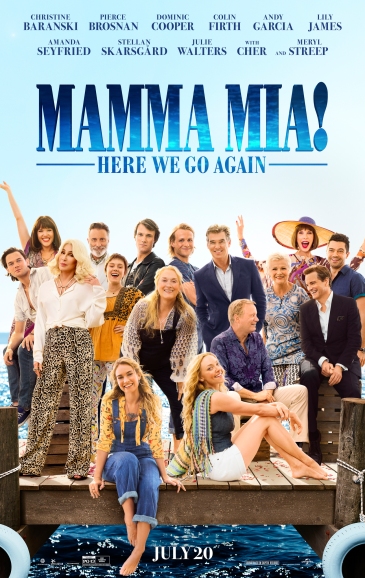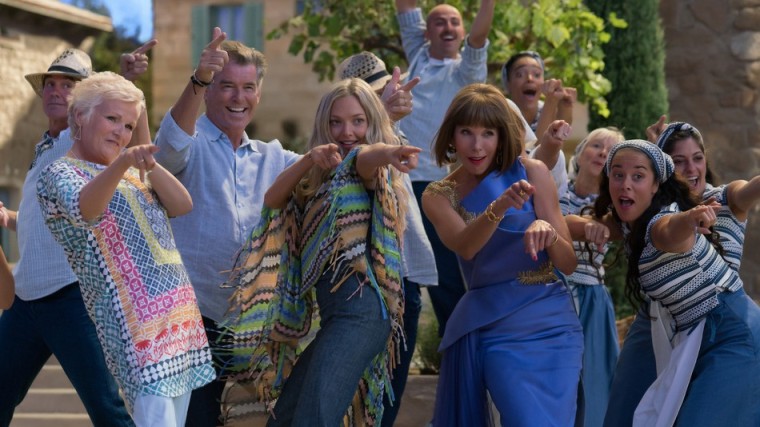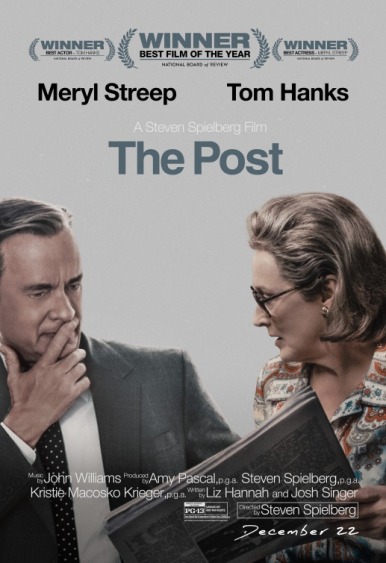Directed By: Ol Parker
Written By: Ol Parker (based on the musical Mamma Mia! by Catherine Johnson)
Starring: Lily James, Pierce Brosnan, Stellan Skarsgard, Colin Firth, Amanda Seyfried

A Mamma Mia movie is like one of those shamelessly campy Bond films of the seventies and eighties, the ones in which the heroines had names like Ocotpussy and the bad guys were horse riding, blimp flying test tube babies built by the KGB: hardwired to withstand exorbitant terribleness. Like those Moore era Bonds and like the songs around which its narrative orbits, a Mamma Mia movie just has something in its genetic code that lends it unique Teflon like abilities; it could never be too bad, so long as it in one way or another proved entertaining.
But therein lays the problem. Mamma Mia 2: Here We Go Again is kind of dull. As it happens a shamelessly reverse engineered plot in which the story consists entirely of contrivances aimed at contextualising the singing of what, to these novice ears, sounds like ABBA’s B-side cast-offs (the group’s essentials were used up in the prior movie) can only be so engaging.
To backtrack, the film itself is a musical in which a selection of ABBA numbers comprise the soundtrack and thus, in theory, much of the narrative thrust. The plot doubles in function, ala The Godfather Part 2, at once serving as prequel and sequel, recounting on one hand how a freshly graduated Donna (Lily James) first came into contact with the three young men who would become so central to her life (Jeremy Irvine/ Pierce Brosnan, Josh Dylan/Stellan Skarsgard, High Skinner/Colin Firth) whilst on the other in present day Donna’s daughter Sophie (Amanda Seyfried) combats disastrous weather and relationship trouble en route to the grand re-opening of her mother’s coastal hotel in Greece (thus concluding any and all viable Godfather comparisons.)
It seems redundant to say the plot is more flimsy connective tissue between prescribed musical numbers than it is any sort of framework for character or story, a concession any reasonable movie goer will be happy make. This is big screen karaoke, better understood through the lens of an animated juke box than through the prism of traditional cinema. What’s problematic however is that said plot, in the shameless transparency of its machinations, can’t help but smack of an idleness and corporate cynicism which constantly threatens to undercut the efforts expended by the film’s effervescent cast. What should be innocuous transitions into vibrant musical set-pieces become alarm bells indicating that behind every step and off-key note is a studio riding the 600-million-dollar wave of Mamma Mia’s initial big screen outing a decade prior. What’s that? We’re in a Napoleon themed café? Close enough’s good enough, cue Waterloo. I can’t believe it, that character’s name was actually Fernando this whole time? That’s unlikely, and handy. It’s a routine which gradually drains the film of its colour.

This isn’t to say that there aren’t traces of charm to be found in the luminousness of the cast. Lily James, embodying Donna’s free-spiritedness with equal parts juvenile vitality and elegance, heads an ensemble that is evidently eager to launch into ABBA’s catalogue with a self-deprecating glee. Pierce Brosnan is either thankfully or regrettably (depending on one’s affinity for comical self-punishment) relieved from singing duties, but still clearly relishes the lunacy of the whole exercise, whilst his non-musical compatriots in Colin Firth and Stellan Skarsgard cheerfully follow suit to infectious results. Julie Walters and Christine Baranski provide a cheeky sense of bad-influence sorority to the film, with the latter, armed with the film’s crudest tongue, serving as a too disparate reminder of Richard Curtis’ influence from behind the keyboard (Curtis is credited with contributing to the story.) Curtis’ trademark amalgamation of crudity and earnestness rears its head through the material just long enough for us to realise what might have been.
It’s peculiar that Ol Parker’s screenplay opts to splinter the cast, isolating them from each other for extended portions of the film and refusing to marshal them into the same space until too late in the piece. In the end, it is the cast’s collective energy which supplies the skeleton for Mamma Mia’s off-kilter sense of spectacle—there’s simply just not as much fun to be had in watching these stars on their own. If the Avengers movies have taught us anything, it’s that there is an inherent cinematic thrill in seeing a hefty collection of larger than life personalities operate in close proximity—a thrill that Parker curiously leaves untapped (thus concluding any and all viable Avengers comparisons.)
What the screenplay’s mismanagement of the cast cannot detract from the performers however is their absolute benevolence — the hurricane of goodwill they generate which in turn encapsulates the niceties and total liberality that Here We Go Again employs as its pillars. Regardless of whatever financial motivations might be lingering over the action, the cast is evidently there to have fun. Combined, they lend an air of purity to Here We Go Again, anchoring proceedings in amiability, even when those proceedings are at their most pedestrian.
Is an acute friendliness enough to redeem the myriad deficiencies to be spotted elsewhere? I can’t say it is. Friendliness and fun aren’t one in the same, and Here We Go Again spends too much of its time on autopilot to be genuinely fun. At most the film packs enough to persuade us to stick around until the end of the track, but it might be time to stop feeding this juke box money.
Rating:
1.75/4



 alone, The Post would be the winningest film of this millennium. The story attacks with a two-pronged socio-political blitzkrieg, on one hand polemicizing governmental censorship of the press, and on the other hand defying the alleged inability of women to hold power in the workplace. It’s a narrative based on fact too, a recounting of how The Washington Post sought to deliver the most veiled of truths to the American public, and how the government scrambled to preserve that veil—a narrative that is uncanny in its timeliness, seemingly a gift from the gods in this maligned period of fake news and alternative facts (the production was in fact streamlined to cash in on the story’s
alone, The Post would be the winningest film of this millennium. The story attacks with a two-pronged socio-political blitzkrieg, on one hand polemicizing governmental censorship of the press, and on the other hand defying the alleged inability of women to hold power in the workplace. It’s a narrative based on fact too, a recounting of how The Washington Post sought to deliver the most veiled of truths to the American public, and how the government scrambled to preserve that veil—a narrative that is uncanny in its timeliness, seemingly a gift from the gods in this maligned period of fake news and alternative facts (the production was in fact streamlined to cash in on the story’s